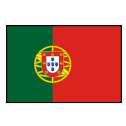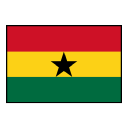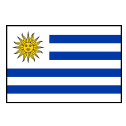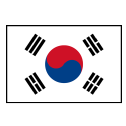ESPN is previewing each of the World Cup's 32 teams ahead of the tournament. Here's what you need to know about the four sides set to do battle in Group H.
Jump to: Portugal | Ghana | Uruguay | South Korea
Also read: Group A | B | C | D | E | F | G

Portugal
Manager: Fernando Santos
Nickname: Selecao (The Selection)
FIFA Rank: 9
How they qualified
"Nothing to see here" was the Portugal mantra as the Euro 2016 champions edged their way to within 180 minutes of direct qualification -- a 2-2 draw in Serbia tucked tidily under their belt. Then, a road bump. A 0-0 draw against Republic of Ireland in Dublin left Portugal needing to beat Serbia at Estadio Da Luz but, leading from the second minute, they fluffed their lines and lost in the 90th minute to finish second in the group. Frustrating, but the beginning of some notable spirit. Beating Turkey 3-1 in Porto in the playoff semifinal was heart-stopping -- Burak Yilmaz missed a late penalty to make it 2-2 -- but taking Italy's conquerors North Macedonia to the same stadium five days later for the final was a walk in the park as Bruno Fernandes scored twice to send Portugal to Qatar.
Style of play
Four clean sheets in the qualifying group and another when it really counted in the playoffs should, theoretically, bring pride and praise. But fans and analysts alike seem unified in the idea that coach Fernando Santos isn't just too defensive-minded but significantly too conservative in maximising a terrifically talented emerging generation of quick, creative footballers.
Biggest strength
In qualifying it was arguably Diogo Jota as he had a far better goal-per-minute ratio than Cristiano Ronaldo, more assists, a big goal in the playoff semifinal (plus one of those assists in the final) ... but he's not fit to make it to Qatar. Can it be goalkeeper Diogo Costa? One of three keepers used in qualifying, the 23-year-old Porto player has a penchant for saving penalties and now looks to have made himself No. 1. Or, let's face it, is it still Ronaldo? Troubled at club level with Manchester United, but the 37-year-old was born to compete when the curtain raises.
Biggest weakness
The Fernando Santos factor. Having won Portugal their first major international trophy at Euro 2016, he is lucky enough that there are high quality players bursting through in every position, so he should really be presiding over a golden era. Instead he has been castigated for a poor Euro 2020 and failed to qualify for the Nations League final four, despite only requiring a draw in their last qualifying match at home to Spain. On the positive side, Santos knows how to win a tournament. On the negative are the growing, but unconfirmed, reports that his players feel mutinous about the team's lack of flair, daring and "front-foot" attitude.
Star player: Rafael Leao
Why wouldn't midfielder Bernardo Silva be in the team of the tournament come the end of the World Cup? Or centre-back Ruben Dias? Some will say Ronaldo, of course, because there's few who have been a bigger star anywhere in the world over the last 20 years. But AC Milan forward Rafael Leao has the capability of surprising everyone.
Projected starting XI
(4-2-3-1): Diogo Costa: Mendes, Dias, Danilo Pereira, Cancelo; Carvalho, Neves; Bernardo Silva, Bruno Fernandes, Leao; Ronaldo.
What the stats say
- Best World Cup finish: 3rd place (1966.)
- Ronaldo is looking to become first player to score in five different World Cups.
FiveThirtyEight SPI: 43% chance to make the quarterfinals, 7% to win the title.
Betting odds: +1200 (via Caesars Sportsbook)
Prediction
Not only do Portugal need to cope with an interesting and disparate group but they've got to be canny. Few teams have greater variety of styles and philosophies than Portugal-Ghana-Uruguay-South Korea. But should Santos' team finish second then, almost certainly, it's Brazil next in the round of 16. Too much, you might say. So if they win the group they may get to face Serbia, who forced them into the playoffs for this tournament in the first place. Life ain't easy. -- Graham Hunter.

Ghana
Manager: Otto Addo
Nickname: Black Stars
FIFA Rank: 61
How they qualified
Ghana pipped South Africa -- against a backdrop of refereeing controversy -- to top Group G of CAF's qualification campaign, losing just once. This set up a mouth-watering double-header against fierce rivals Nigeria, by which point optimism was low after they finished bottom of their group at the Africa Cup of Nations. However, buoyed by the appointment of Otto Addo, the Black Stars held their nerve to advance on away goals. A 0-0 draw in Kumasi was followed by a 1-1 draw in Abuja, with Thomas Partey's 10th-minute opener ultimately securing progression.
Style of play
Midfield is key, where Partey will attempt to control the play alongside the more defensive-minded Iddrisu Baba. In-form Mohammed Kudus offers a goal threat through the middle, with the Ayew brothers Andre and Jordan and likely Inaki Williams, who was born in Spain but made the switch to represent Ghana earlier this year. Whether playing with a back four or a back three, full-backs such as Denis Odoi, Tariq Lamptey and Abdul Rahman Baba can offer a threat from out wide.
Biggest strength
The new arrivals -- particularly Lamptey and Williams -- have raised Ghana's quality and given them new energy, helping the Black Stars turn the page after the miserable AFCON campaign. The pair's technical attributes, coupled with the tactically astute Addo, should give Ghana the flexibility to switch between a 3-4-3 and a 4-2-3-1 formation, depending on the demands of each fixture.
Biggest weakness
While Ghana demonstrated resilience and maturity to edge past Nigeria in the qualifiers, that showing was an anomaly for this squad. It remains to be seen if Addo has truly eradicated the brittleness that has affected them in the past; witness Andre Ayew's petulant behaviour at the conclusion of Ghana's AFCON draw with Gabon, his inflammatory comments after that match or his early red card when the Black Stars needed him most in their subsequent fixture against Comoros. Partey's fitness is similarly fragile -- he withdrew from a friendly against Brazil in September just moments before kick-off -- and both mentally and physically there remain serious questions about Ghana's durability.
Star player: Mohammed Kudus
Kudus has replaced Partey as Ghana's great hope for the World Cup following a sensational start to the season with Ajax. It's been a remarkable turnaround for the 22-year-old, who was reportedly pushing for an exit from the club in the summer transfer window, skipping training in a bid to force a move having struggled for game time. It's been all change since, as Kudus has had a hand in nine goals in the Eredivisie and Champions League since the start of September, including a stunner scored against Liverpool. Ajax's use of him as a false No. 9 could be an interesting blueprint for Addo to explore.
Projected starting XI
(4-2-3-1): Wollacott; Baba, Djiku, Amartey, Odoi; Iddrisu, Partey; A Ayew, Kudus, J Ayew; Williams
What the stats say
- Best World Cup finish: Quarterfinals (2010.)
- Ghana are the last African team to reach the quarterfinal stage of a World Cup and were the 3rd all-time to do so.
FiveThirtyEight SPI: 12% chance to make the round of 16, 2% to make quarterfinals.
Betting odds: +15000 (via Caesars Sportsbook)
Prediction
The 3-0 thumping by Brazil in September has dampened expectations, prompting a reality check after the euphoria of their playoff triumph. A tough group means they're up against it, and a first round exit looks likely. However, Ghana may be quietly confident that in grudge matches against ageing Portugal and Uruguay teams, their youth and vitality can cause an upset. -- Ed Dove, ESPN Africa.

Uruguay
Manager: Diego Alonso
Nickname: La Celeste (The Sky Blue)
FIFA Rank: 14
How they qualified
With problems ... and with a late change of coach. With four rounds to go, the epic, and hugely successful, 16-year reign of Oscar Washington Tabarez came to an end and in came Diego Alonso for the last few rounds. Tabarez could not resist the urge to stay on after Russia 2018, for obvious reasons. His young midfielders -- now the best part of the team -- would come of age and the old guard -- the likes of Luis Suarez, Edinson Cavani and Diego Godin -- would still be around for a fourth World Cup. But Tabarez never managed to get the balance right. More than anything, though, he was undone by a combination of injuries and a nightmare run of fixtures. Uruguay's World Cup place was at risk with four defeats on the bounce until Alonso, with the benefit of much easier fixtures against Paraguay, Venezuela, Peru and Chile, saw them over the line.
Style of play
Variable. Alonso likes to prepare on a game-by-game basis, and his team have already used a number of different formations and approaches, with the capacity to change during matches. They are more likely to sit deep and create space for a counter attack, but can also push up higher if necessary.
Biggest strength
Uruguay can count on centre-backs such as Jose Maria Gimenez and Ronald Araujo (assuming he wins his fitness battle), midfielders like Federico Valverde and Rodrigo Bentancur, and Darwin Nunez, Suarez and Cavani up front. That is an inspiring array of talent from a country with a population of little more than three million. Over the last two decades, Uruguay have done splendid work at U20 level, which has provided them with a conveyor belt of talent with which to refresh their senior side. And if Alonso can get the balance of the side right, then, with individual ability backed up by Uruguay's fighting spirit, no one will relish facing them.
Biggest weakness
A spate of recent injuries has not helped, but it is still not clear how the team will line up. Coach Alonso has some big decisions to take, both about personnel and about formation. Playing to the side's current strength almost certainly means a trio in the centre of midfield. But that makes it hard to have two up front (unless perhaps there is a move to a back three, which could be the best way to fit in 36-year-old centre-back and captain Godin). But if there is only room for one out-and-out striker, then should it still be Luis Suarez? And does the side have enough attacking pace to stop them being pinned back?
Star player: Federico Valverde
Valverde was the first of Uruguay's new generation of midfielders to be promoted to the senior side, but then succumbed to injury and was forced out of Russia 2018. He is no longer the new boy. The Real Madrid man is now the beating heart of the Uruguay side with his stamina and versatility. Becoming an important part of the Madrid first team has done wonders for his confidence, giving him the self-belief to quietly proclaim himself as the most important member of the Uruguay side, desperate to go to Qatar and make up for the disappointment of missing out on Russia.
Projected starting XI
(4-3-3): Rochet; Suarez, Araujo, Gimenez, Olivera; Vecino, Bentancur, Valverde; Pellistri, Suarez, De Arrascaeta
What the stats say
- Best World Cup finish: Champion (1930, 1950).
- Changed head coaches in January and still made tournament by rattling off four straight CONMEBOL qualifying wins.
FiveThirtyEight SPI: 66% chance to make the round of 16, 15% to make semifinals.
Betting odds: +5000 (via Caesars Sportsbook)
Prediction
Uruguay are one of the hardest teams to predict, because of their own dilemmas and also the ferociously balanced nature of the group. Alonso says the team are aiming to win the trophy, but if he fails to get the balance right, it could be a case of elimination at the group stage. However, it is worth recalling that, statistically at least, Uruguay have been South America's best team in two of the last three World Cups. -- Tim Vickery.

South Korea
Manager: Paulo Bento
Nickname: Taegeuk Warriors
FIFA Rank: 28
How they qualified
South Korea were hardly troubled as they maintained their impressive record of qualifying for every World Cup since 1986 -- with this year's tournament set to be their 10th consecutive appearance. Entering the Asian qualifiers in the second round, the Taegeuk Warriors topped a fairly comfortable Group H with five wins and a draw, scoring 22 goals and conceding just once. Things expectedly got trickier in the third round but they were arguably handed a favourable draw and were always expected to claim a top-two finish alongside Iran, which duly proved to be the case as South Korea finished a comfortable 11 points ahead of third-placed United Arab Emirates.
Style of play
Since finishing fourth at the 2002 World Cup under Guus Hiddink, South Korea have been associated with a brand of high-octane football where they rarely give their opponents time and space in their defensive third. Under current coach Paulo Bento, they tend to be a little more conservative but boast plenty of penetration to hurt teams in transition.
Biggest strength
Without trying to make this all about one player, South Korea's greatest strength arguably lies in the fact that they have a genuine world-class player at their disposal -- which is not something many of the other 32 teams can lay claim to. After a stunning season with Tottenham that saw him share the Premier League golden boot with Mohamed Salah, Son Heung-min has already stated his determination to do well at this World Cup, especially after a disappointing group-stage exit last time out, but has to recover from facial surgery first. There is also a capable supporting cast of fellow Europe-based names, including Kim Min-jae (Napoli), Hwang Hee-chan (Wolves) and Lee Kang-in (Mallorca.)
Biggest weakness
Of course, the fact that the Taegeuk Warriors boast such a talismanic star also means they run the risk of being overly reliant on Son. But perhaps the greater weakness is that, apart from Napoli defender Kim, the South Korea backline will hardly strike fear in the hearts of opposition attackers. It is perhaps for this very reason that Bento tends to adopt a conservative approach and his insistence on deploying an anchorman to shield the defence -- usually Jung Woo-young -- usually prevents South Korea from deploying their three most creative playmakers together, with Hwang In-beom, Lee Jae-sung and Lee Kang-in usually vying for just two berths.
Star player: Son Heung-min
It is impossible to look past Son as South Korea's star player. But given his fitness is in doubt and the side will be coming up against some formidable opposition attackers -- including Cristiano Ronaldo and Luis Suarez -- the man who could have the biggest influence on how far the Taegeuk Warriors go might just be Kim. Standing at 6-foot-3 and strongly built, Kim is perfectly equipped to handle any striker he comes up against and it is hardly a surprise that he has already emerged as one of Serie A's leading centre-backs just months after joining Napoli from Fenerbahce in the summer.
Projected starting XI
(4-2-3-1): Kim Seung-gyu; Kim Tae-hwan, Kim Min-jae, Kim Young-gwon, Kim Jin-su; Jung Woo-young, Hwang In-beom; Hwang Hee-chan, Lee Jae-sung, Son Heung-min; Hwang Ui-jo.
What the stats say
- Best World Cup finish: 4th place (as hosts in 2022.)
- South Korea's 10 straight World Cup appearances are the longest by a team outside of Europe or South America.
FiveThirtyEight SPI: 45% chance to make the round of 16, 16% to make quarterfinals.
Betting odds: +25000 (via Caesars Sportsbook)
Prediction
Games against Portugal and Uruguay, two teams perennially expected to reach the knockout round, will not be easy -- and Ghana are no slouches either. But if Son is fit and firing, South Korea could stand a chance. Victory over Ghana is a must and, should they manage to get a point off either Portugal or Uruguay, a round-of-16 berth could be on the cards. -- Gabriel Tan, ESPN Asia.
WHAT ELSE YOU NEED TO KNOW
- All World Cup 2022 squads
- World Cup news
- World Cup fixtures
